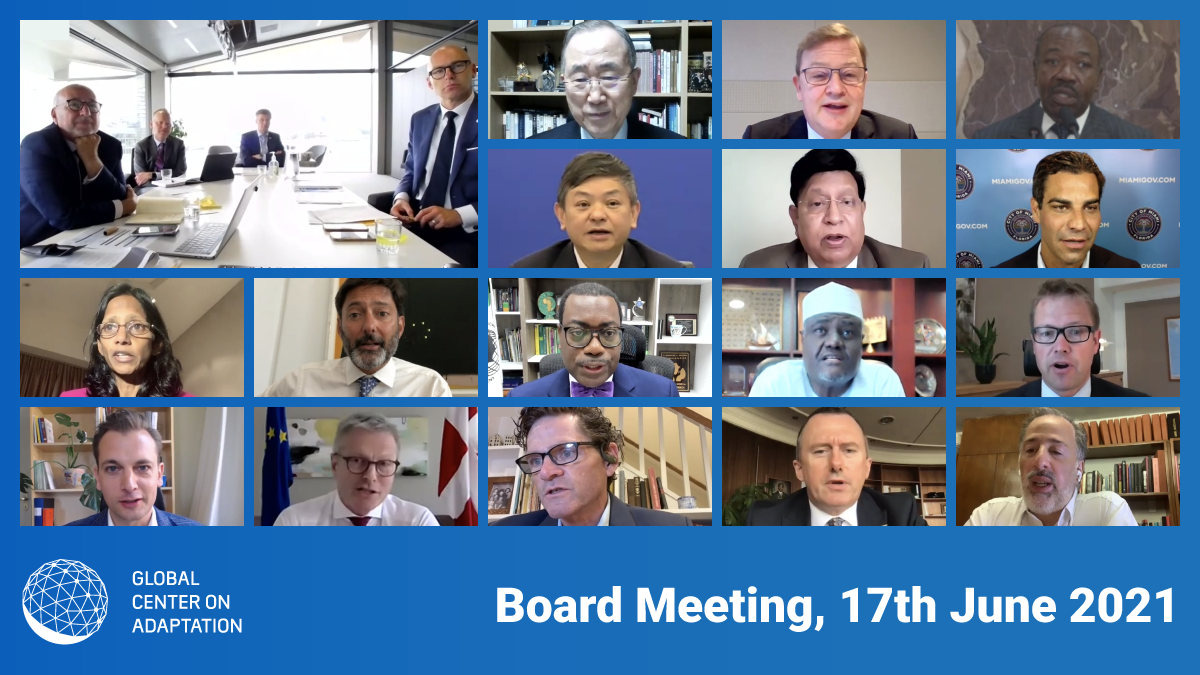Moussa Faki, Chairperson of the African Union Commission, shows support for Africa Adaptation Acceleration Program in his inaugural address to GCA Board
R
otterdam, 17 June 2021 – Today, Moussa Faki, Chairperson of the African Union Commission, outlined his support for the Africa Adaptation Acceleration Program (AAAP) during his inaugural address to the Board of the Global Center on Adaptation (GCA). Chairperson Moussa Faki, who officially joined the GCA Board today, heads the Executive Council of the pan-African organization representing its 54 member states, and is a key voice in articulating the adaptation needs of the African continent.
Speaking about GCA’s flagship program, Chairperson Moussa Faki remarked that:
[it is] clear that the Africa Adaptation Acceleration Program is the right initiative at the right time. I am pleased that the program is developed and owned by the African continent. This is crucial.
The Africa Adaptation Acceleration Program builds on the African Union Commission Climate Change Strategies and Agenda 2063 as well as the Africa Adaptation Initiative endorsed by the African Union and championed by President of Gabon, Ali Bongo Ondimba.
Chairperson Moussa Faki also noted that “the Africa Adaptation Acceleration Program is exactly what the continent needs to realize a step change in adaptation action.
Ban Ki-moon, 8th Secretary-General of the United Nations and Chair of the Global Center on Adaptation, said:
Africa is on the frontline of our climate emergency and can lead the world on a new model of climate led development to help us reach the Sustainable Development Goals. Chairperson Faki’s leadership and guidance on this will be invaluable as the Global Center on Adaptation works with the African Union and partners to implement the Africa Adaptation Acceleration Program across the continent.
Patrick Verkooijen, CEO of the Global Center on Adaptation said:
Africa will bear the brunt of climate impacts and needs to accelerate adaptation to ensure it can survive increasing shocks. The Africa Adaptation Acceleration Program will not only help address these short term challenges but can also guide the continent on the path to resilience and future prosperity envisioned by the African Union. I look forward to working closely with Chairperson Moussa Faki and benefiting from his wide-ranging experience in support of African leadership on innovative solutions which other regions can also adopt to meet their own challenges.
AAAP, developed in partnership with the African Development Bank, aims to galvanise climate resilient action across the African continent through a triple win approach to address the impacts of Covid-19, climate change and the economy. The program focuses its activities across four key pillars: Climate Smart Digital Technologies for Agriculture and Food Security; Infrastructure Resilience Accelerator; Empowering Youth through Jobs and Entrepreneurship; and Innovative Financial Initiatives for Africa. GCA and the African Development Bank aim to mobilize the remaining US$12.5 billion of the program’s funding requirements, in addition to the US$12.5 billion already committed by the African Development Bank, by 2025.
Notes to Editors
About the Global Center on Adaptation
The Global Center on Adaptation (GCA) is an international organization which works as a solutions broker to accelerate action and support for adaptation solutions, from the international to the local, in partnership with the public and private sector, to ensure we learn from each other and work together for a climate resilient future. Founded in 2018, the GCA is hosted by the Netherlands, working from its floating office headquarters in Rotterdam with regional offices in Africa, South Asia and Asia Pacific and a knowledge and research hub based in Groningen. Through its evolving network of offices, GCA engages in innovative solutions to drive adaptation at scale, high-level policy development, new research contributions, advocacy, communications, and work with partners to deliver action on the ground. Its work focuses on those who are the most vulnerable to the effects of climate change including the poorest people in the poorest countries. They are the least prepared to withstand the triple health, social and economic impacts of our climate emergency.
